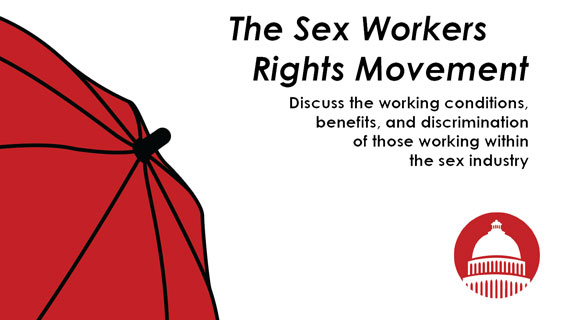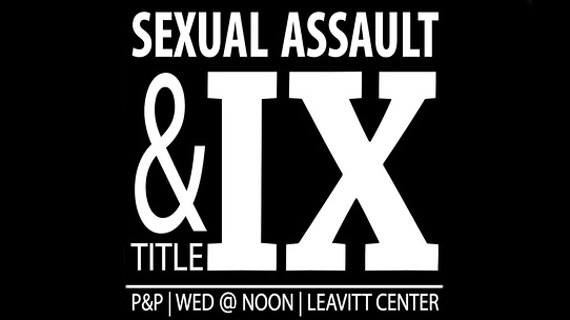Pizza & Politics - Sex Workers' Rights Movement
Posted: September 04, 2018 | Author: Cami Mathews | Read Time: 5 minutes
 The Michael O. Leavitt Center for Politics and Public Service hosts Pizza & Politics every Wednesday at noon to discuss a current political topic. Leavitt Center student employees research the topic and moderate the conversation. These discussions expose students to a variety of important issues and encourages them to share their own perspectives while learning all sides of an issue. Free pizza is provided for all who attend.
The Michael O. Leavitt Center for Politics and Public Service hosts Pizza & Politics every Wednesday at noon to discuss a current political topic. Leavitt Center student employees research the topic and moderate the conversation. These discussions expose students to a variety of important issues and encourages them to share their own perspectives while learning all sides of an issue. Free pizza is provided for all who attend.
This week’s Pizza & Politics discussion was on the Sex Workers’ Rights Movement. The movement seeks to improve working conditions, increase benefits, and eliminate discrimination on behalf of individuals working within the sex industry, whether legal or criminalized. Moderators for the discussion were Victoria Stephens and Emilie Elizalde, Executive Council members in the Leavitt Center.
For the discussion, it was important to define sex workers to make sure the audience started on the same page. Sex workers are adults who receive money or goods in exchange for consensual sexual services or erotic performances, either regularly or occasionally.
Currently in the United States, prostitution is criminalized, meaning all parties involved in the sale or solicitation of sex acts will be punished. There is the option to decriminalize sex work which would create laws and policies that provide protection for sex workers from acts of exploitation and abuse. There is also the option to legalize sex work, which would introduce laws and policies specific to sex work to formally regulate it.
In Bolivia, sex work has been legal since 2001. It can be advertised from permitted brothels and licensed sex workers. They are required to undergo STI testing every twenty days and law enforcement can check their registration status to see when workers last attended a clinic for testing.
The Netherlands legalized prostitution in 2000. Sex workers do not have to submit to any STD testing, but it is provided for free by the government. The country has proposed that sex workers should be required to carry around an ID card with no personal info, just an identification number.
Should the United States legalize or decriminalize prostitution?
The audience was split fifty-fifty to start the discussion. Half of the group felt that sex work should be legal across the country. The other half said it should be kept illegal. Those who preferred legalizing the industry felt that was a better plan than decriminalizing it. For the most part, audience members who did not want to legalize sex work seemed to have a moral problem with the acts.
What are ways to reduce health risks among sex workers?
According to the World Health Organization, female sex workers are 13.5% more likely to be living with HIV than other women of reproductive age. In a study conducted by the Open Society Foundation, 52% of sex workers said there have been times when they have opted not to carry condoms because of fear of problems with the police.
Students suggested that sex workers should be encouraged to get STI and STD testing regularly. Education on the matter is key for both the sex workers and clients. Other suggestions wanted the buyers to go through testing before being cleared for set-ups. The answers presented were more for street-level sex work, as opposed to professional-level escort services.
If the U.S. were to legalize prostitution, which regulations should be implemented?
Nevada is the only state where prostitution is legal. Brothels are only permitted in counties with less than 700,000 citizens. They must be licensed and pay an annual fee between $100,000 and $200,000. Prostitutes must be twenty-one, in two counties they only have to be eighteen, and they must undergo weekly STI and monthly STD testing. Condoms are mandatory and prostitution anywhere other than a licensed brothel is illegal.
The audience agreed that Nevada’s system seems to work well and could lead to similar set-up around the nation. Students agreed with the rule that workers have to go through routine STD and STI testing, but felt the customers should have to do the same. If the U.S. were to legalize prostitution, it was agreed upon that the county population should not affect the location of brothels.
Should there be designated areas for sex workers, such as red light districts?
Switzerland, in 2012, approved a $2 million city plan to build several drive-in structures in a safe and discreet environment. The purpose was to improve the working conditions regarding workers’ health, physical, and mental integrity. In return, workers are expected to pay taxes and contribute to their Social Security funds.
The first responses to this question said that sex workers should have designated areas, like buildings or districts where customers can visit. But then comments came in that sex workers should choose where they want to work and should not be regulated by the government. The final comments seemed to get the crowd together and unite the ideas - sex workers should not be forced to work in designated areas, but should have places to go if they choose to work there.
Is there a way to get rid of the stigma around sex workers?
Each comment on this question felt there was a way to rid of the stigma. Many people enjoyed that the Leavitt Center was able to discuss this topic, pointing out that education is the first step to get rid of the stigma. Students united in thought by saying sex workers are humans and should be treated as that; sex worker rights are human rights.
For more information on Pizza & Politics, or other Leavitt Center events, visit their Facebook page.
This article was published more than 3 years ago and might contain outdated information or broken links. As a result, its accuracy cannot be guaranteed.
Tags: Entrepreneurship School of Business



